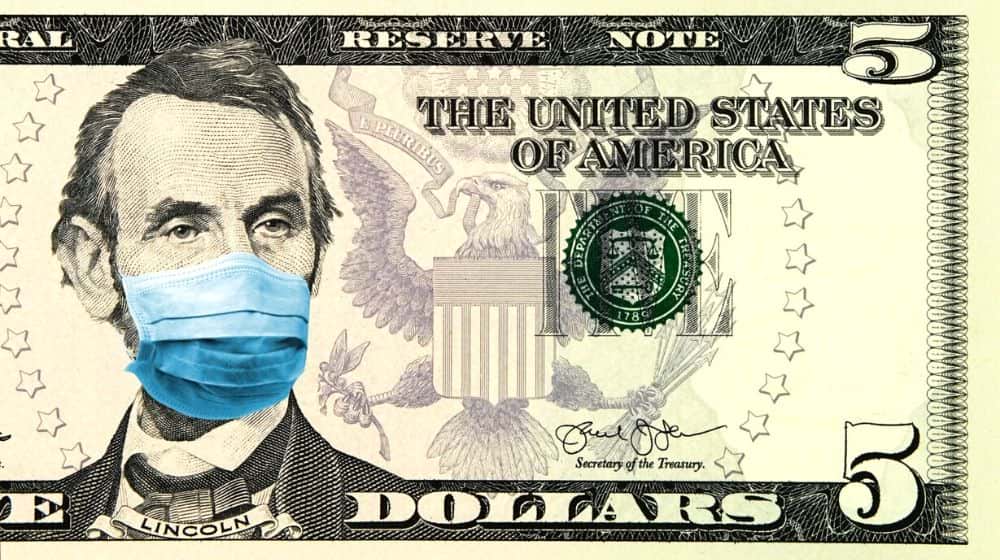Breaking News
Coronavirus Leads to Worst Week for Markets since Financial Crisis

The rapid spread of the coronavirus has triggered the biggest plunge in global stock markets since the financial crisis, amid rising fears over the impact on the world economy of the deadly disease and the efforts to contain it.
An increasing number of countries and companies are imposing tough measures to limit the spread of the Covid-19 disease, with mounting costs for company profits and growth.The outbreak has led to the fastest reversal for the stock market since 1933 during the Great Depression.
Wall St has slumped from record-breaking highs to the lowest point since 2016, with more than $5tn (£3.9tn) wiped off the value of global markets over the past week alone.The economic consequences are becoming increasingly evident in a fast-moving crisis.
Markets
Links to Globalisation and superpowers geographies – the economic consequences of covid-19
Coronavirus leads to worst week for markets since financial crisis https://t.co/gMOkLNjiN9— @RainfordGeography (@RainfordGeog) February 29, 2020
Global stock markets have had their worst week since the depths of the 2011 sovereign debt crisis and Greek bailout, reflecting the growing fear over the economic catastrophe as it rapidly unfolds.
Wall Street suffered its worst one-day fall ever – with the Dow Jones Industrial Average plummeting by 1,190 points on Thursday.
The FTSE 100 lost 823 points over the week – equal to £206bn wiped off the value of the top 100 companies – to finish at 6,580.61. Shares in airline companies including easyJet and the British Airways owner, IAG, have been among the hardest hit. The cruise firm Carnival – the operator of the Diamond Princess ship, quarantined for coronavirus cases with one Briton among those killed by the disease on board – has lost a fifth of its stock market value.
Global investors rushed to buy assets considered safe havens in times of stress – including government bonds and gold – sending the yield of US Treasury bonds to the lowest level on record.
Economics
The halting of activity to contain the virus, the fear factor keeping consumers away from shops, and the disruption to complex international supply chains will dramatically drag down global growth.
Although the mortality rate remains comparatively low, the actions to control the virus are now having a big impact, as business travel and conferences are cancelled and world trade and consumer activity falter.
David Owen, the chief European economist at the US bank Jefferies, said: “The bottom line is we really don’t know what will happen, but what we do know is that the fear factor and the way people change their behaviour makes the difference.”
Two weeks ago economists were estimating that the coronavirus outbreak would have an impact similar to the Sars outbreak of 2002-03, when growth faltered in China then rebounded rapidly.
However, China now makes up almost a fifth of world GDP, compared with just 4% at the turn of the millennium, and global growth was already weak after the US-China trade war.
After promising to double gross domestic product (GDP) and income per head in the decade to 2020, the Chinese communist party is now on the cusp of failure.
Hitting the target would require GDP to grow by about 5.8%, yet some economists now believe growth in the world’s second-largest economy could slow to 3% this year.
The Italian economy, at the centre of the European outbreak, was already shrinking at the end of last year, raising the prospect of a near-certain recession in the country at a delicate moment for the Eurozone.
Transport and Tourism
IAG said on Friday it was impossible to predict how far the coronavirus impact might go. Although stock markets initially punished airlines flying to China, easyJet – purely shorthaul with an almost entirely European network – has slumped after warning that 500 Italian flights would be cut. IAG said flights to all parts of Italy had been dramatically affected and reported a high rate of booked passengers choosing not to show up.
Hong Kong-based Cathay Pacific remains the hardest hit outside the Chinese mainand, and has cut a third of its capacity. Major US and European carriers have axed direct flights to China, and falling demand has also hit destinations in neighbouring countries.
More broadly, there is a huge reduction in business travel. The US-based Global Business Travel Association said coronavirus could wipe out 37% of total global spending on work trips, equal to $46.6bn a month. A survey of more than 400 of its member companies found 65% had cancelled meetings or events. While virtually all had suspended business trips to China, 23% reported suspending some trips to European countries.
Booking Holdings, one of the main online travel agents which owns a number of brands, said room bookings have dropped up to 10% year on year in this quarter, and rates have declined.
Chinese outbound travel is also a major concern for tourism businesses. According to an ING analysis, the dearth of Chinese tourists could cost Asia $112bn in revenues this year, with a major effect in destinations such as Japan, Thailand and Bali. The Chinese are also big spenders at their destinations and in airports. The owner of Paris’s airports, ADP, said a 2% drop in Chinese passengers had caused a 15% drop in retail sales.
Retail and Luxury
Brands ranging from Prada to Primark are suffering as consumer spending collapses and factories are disrupted.
Analysts have warned €40bn (£34bn) could be wiped off luxury goods sales as domestic and overseas travel restrictions put the brakes on the spending of wealthy Chinese. They have pointed to firms such as Swatch, which owns Omega watches, Richemont ( the company behind Cartier, Panerai and Net-a-Porter) and Prada as being in the front line of the downturn.
The outbreak is also disrupting the supply chains of mainstream retailers which source mountains of clothing, electricals and toys in China. Primark, which buys 40% of its clothing there, has warned there could be shortages this year if delays continue.
The toy trade, which imports 70-80% of its products from China, is particularly vulnerable. Gary Grant, the executive chairman of the toy retailer The Entertainer, warned that if things were not back to normal by May there could be shortages come Christmas. “Hardly anything is leaving China,” he explained, adding factories that wanted to resume work were hampered by their own fractured supply chains.
The Retail Economics chief executive, Richard Lim, said some retailers were facing big problems. He said: “One retailer I spoke to relied on one component being produced in China that they haven’t been able to get for five to six weeks. They will run out of their main product which accounts for 70% of their sales within weeks. This is a well-known UK retailer that has over 600 stores.”
The drinks company Diageo has suffered a £200m hit to profits due to the closure of bars and restaurants in China. Anheuser-Busch Inbev, which owns brands including Budweiser, also reported a $170m profit hit in China due to “almost no” nightlife.
Finance
Highlight: The coronavirus has "really had a small impact on us," @PepsiCo CFO Hugh Johnston. "It affects our productivity a little bit… but by and large, our supply chain is really resilient and sturdy." Full comments: pic.twitter.com/DiuoLzLPLb
— Yahoo Finance (@YahooFinance) April 28, 2020
Chinese banks, and lenders with large Asian operations, will be exposed to a spike in bad debts if affected customers start to default on their loans.
S&P Global Ratings has warned that China’s 30 largest lenders, including Industrial and Commercial Bank of China and China Construction Bank, could face bad debts of £847bn if the virus is not contained by April.
Business customers are expected to struggle to keep up with payments if the outbreak hits their sales. Banks such as Standard Chartered are allowing borrowers to make interest-only payments on their debts. The bank has already warned it will miss its financial targets this year as a result of the virus.
HSBC, which counts Hong Kong as its largest market, could be forced to set aside as much as $600m to deal with the potential fallout.
Manufacturing and Carmakers
The cancellation of the Geneva International Motor Show, the biggest car show scheduled in Europe this year, is just one symbol of the turmoil hitting the automotive sector.
The centre of the global outbreak was Wuhan, one of China’s key car manufacturing centres with 12 separate plants. Quarantine conditions have meant weeks of lost output.
The effects of squeezed supply chains have not yet been felt at most major UK plants, such as Nissan’s Sunderland factory or Peugeot’s Vauxhall sites. However, the digger maker JCB has had to cut production at its Staffordshire factories and Jaguar Land Rover has warned it has little more than a week left before it faces a shortage of key components.
Chinese car sales plummeted by 92% in the first half of February according to the China Passenger Car Association. Analysts fear that the freeze on sales will spread to Europe as people put off major purchases.
Entertainment
China had been forecast to overtake the US as the world’s biggest movie market this year. The coronavirus outbreak has put paid to that with the 70,000 screens in 11,000 complexes across China shut since 24 January. The cost to the global box office is heading towards $2bn, with China the biggest overseas market for Hollywood films.
Beyond film, Disney’s theme parks in Shanghai and Hong Kong remain shut, and two parks in Tokyo have just been closed until mid-March.
Tech and Telecoms
Microsoft warned this week that its personal computer business would be hit by production shutdowns in China. Apple was the first big tech company to warn of the financial impact of the virus, warning of potential “iPhone supply shortages”, as it also relies on China for much of its production.
Oil and Natural Resources
Coal consumption at Chinese power stations has collapsed in recent weeks, while supertankers capable of holding more than 2m barrels of crude oil each have been left stranded outside China’s main import terminal of Qingdao after the shutdown of refineries.
The International Energy Agency estimates that refinery slowdowns may have shaved more than 1m barrels a day from global oil demand.
Oil prices have tumbled by more than 10% in the last week to below $50 a barrel for the first time in more than a year. Oil producers had expected the benchmark Brent crude price to average almost $60 a barrel this year.












